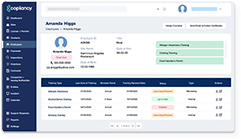In today’s fast-paced and ever-evolving regulatory landscape, businesses must stay vigilant to ensure they comply with constantly changing laws, regulations, and industry standards. Failure to keep up with regulatory changes can result in costly fines, legal issues, and reputational damage. This is where Regulatory Change Management (RCM) software comes into play. RCM software provides businesses with the tools needed to manage, track, and respond to regulatory changes efficiently, helping them stay compliant and reduce risk.

This article explores the key features and benefits of RCM software, how it helps organizations manage compliance more effectively, and why it’s becoming a vital tool in industries with high regulatory demands.
1. What Is Regulatory Change Management (RCM) Software?
Regulatory Change Management (RCM) software is a specialized solution designed to help businesses monitor, manage, and implement changes in regulations and compliance requirements. It serves as a central hub for tracking regulatory updates, analyzing their impact, and coordinating necessary changes in policies, procedures, and business operations. Stay ahead of compliance with Copliancy — the trusted choice in RCM software.
Key Functions of RCM Software:
- Monitoring Regulatory Changes: The software continuously scans for updates from regulatory bodies, providing alerts when new laws, rules, or amendments are introduced.
- Impact Analysis: RCM software helps organizations assess how regulatory changes will impact their operations, policies, or compliance procedures.
- Automated Workflows: It automates the processes of assigning tasks, updating policies, and communicating changes to relevant departments or employees.
- Compliance Documentation: RCM software stores and manages all compliance-related documents, ensuring that records are up to date and easily accessible for audits or reporting.
- Audit and Reporting Tools: The software generates reports and audit trails to help businesses demonstrate compliance during regulatory reviews or inspections.
RCM software is essential for industries such as finance, healthcare, pharmaceuticals, manufacturing, and energy, where compliance with complex and frequently changing regulations is critical.
2. Why Regulatory Change Management Is Important
In industries with strict regulatory requirements, staying compliant is not just about avoiding fines or penalties—it’s about ensuring operational integrity, protecting consumer safety, and maintaining a strong reputation. Regulatory Change Management software helps organizations navigate the challenges of compliance by providing a structured and automated approach to managing regulatory updates.
Key Reasons RCM Is Crucial:
- Rapidly Changing Regulations: Regulations can change frequently and vary between regions or industries. RCM software ensures that businesses can keep pace with these changes without missing crucial updates.
- Avoiding Compliance Violations: Non-compliance can lead to legal penalties, fines, and reputational damage. RCM software ensures that businesses are aware of new regulations and take the necessary steps to remain compliant.
- Efficiency and Automation: Manual compliance management can be time-consuming and prone to errors. RCM software automates tasks like tracking changes, updating policies, and managing documentation, freeing up resources and reducing the risk of mistakes.
- Improved Risk Management: By ensuring that regulatory changes are tracked and implemented correctly, RCM software helps businesses reduce risks associated with non-compliance and maintain operational continuity.
3. Key Features of RCM Software
RCM software provides a variety of features to help businesses manage regulatory changes and ensure ongoing compliance. Here are some of the most important features that businesses should look for in an RCM solution:
1. Automated Regulatory Alerts
One of the primary functions of RCM software is to continuously monitor regulatory updates from government bodies, industry associations, and regulatory agencies. The software provides automated alerts when new regulations are issued or existing rules are amended, ensuring that businesses receive timely notifications.
2. Impact Assessment
When a new regulatory change is identified, RCM software can help assess how it will affect the business. This includes determining which departments, processes, or policies are impacted and what actions need to be taken to comply with the new requirements.
3. Centralized Compliance Documentation
RCM software serves as a repository for all compliance-related documents, including updated policies, procedures, and reports. By centralizing these documents, businesses can ensure they are easily accessible for audits, internal reviews, and reporting to regulators.
4. Automated Workflows
RCM software automates many of the manual tasks associated with managing regulatory changes. This includes assigning tasks to the appropriate teams, setting deadlines for implementing changes, and tracking the progress of compliance activities. Automated workflows ensure that nothing falls through the cracks and that all stakeholders are aware of their responsibilities.
5. Audit Trails and Reporting
RCM software provides detailed audit trails that document every step of the regulatory change management process. This includes tracking who was responsible for implementing changes, when actions were completed, and how compliance was achieved. These audit trails are essential for demonstrating compliance during regulatory inspections or audits.
6. Real-Time Collaboration
Regulatory changes often require input from multiple departments, such as legal, operations, HR, and compliance. RCM software facilitates real-time collaboration by providing a platform where teams can communicate, share documents, and track progress. This ensures that everyone is aligned and working toward the same compliance goals.
4. Benefits of Implementing RCM Software
Investing in Regulatory Change Management software provides numerous benefits that can significantly improve a business’s ability to manage compliance and reduce risk.
1. Increased Efficiency
RCM software automates the tracking and management of regulatory changes, reducing the amount of time and effort required to stay compliant. This frees up resources, allowing teams to focus on more strategic activities rather than manual compliance tracking.
2. Improved Compliance and Reduced Risk
By automating regulatory change management, businesses are less likely to miss important updates or fail to implement necessary changes. This reduces the risk of non-compliance, legal penalties, and reputational damage.
3. Better Resource Allocation
With RCM software, businesses can allocate resources more effectively by identifying which departments or processes will be affected by regulatory changes. This ensures that compliance activities are focused where they are needed most, reducing inefficiencies and minimizing disruption to operations.
4. Enhanced Visibility and Control
RCM software provides real-time insights into the status of compliance activities, allowing management to monitor progress and ensure that changes are implemented on time. This visibility ensures that businesses can respond quickly to regulatory changes and maintain control over their compliance processes.
5. Streamlined Audit Preparation
During audits or regulatory inspections, businesses need to provide evidence of their compliance efforts. RCM software simplifies this process by providing organized records, audit trails, and reporting tools that demonstrate how regulatory changes were managed and implemented.
5. Industries That Benefit from RCM Software
While all industries face regulatory challenges, some industries are particularly reliant on RCM software due to the complexity and frequency of regulatory changes they face:
1. Financial Services
Financial institutions, such as banks, investment firms, and insurance companies, are subject to stringent regulations covering everything from anti-money laundering (AML) to data privacy and reporting requirements. RCM software helps financial organizations stay compliant with these regulations and avoid costly fines or legal actions.
2. Healthcare and Pharmaceuticals
Healthcare organizations and pharmaceutical companies must comply with a wide range of regulations, including patient privacy (HIPAA), drug approvals (FDA), and clinical trials. RCM software ensures that these companies can manage regulatory changes efficiently and maintain compliance with ever-changing standards.
3. Manufacturing
Manufacturers are often subject to regulations related to product safety, environmental impact, and labor laws. RCM software helps manufacturers track changes in safety standards, environmental regulations, and industry certifications, ensuring that products and processes comply with the latest requirements.
4. Energy and Utilities
The energy sector faces complex regulations covering environmental impact, safety, and emissions. RCM software enables energy companies to manage regulatory changes in these areas, ensuring compliance with government regulations and industry standards.
6. Choosing the Right RCM Software for Your Business
When selecting an RCM software solution, it’s essential to choose a platform that meets the specific needs of your organization. Consider the following factors when evaluating different RCM solutions:
- Customization: Choose a solution that can be tailored to your industry and specific regulatory requirements.
- Integration: Ensure the software can integrate with your existing systems, such as compliance management platforms, document management tools, or risk management systems.
- Scalability: As your business grows, the regulatory landscape may become more complex. Choose an RCM solution that can scale with your business and adapt to changing needs.
- User-Friendly Interface: Opt for software that is easy to use and intuitive for both compliance teams and other stakeholders.
- Customer Support: Ensure the software provider offers reliable customer support and resources to help your team make the most of the solution.
In a regulatory environment where compliance is critical to business success, Regulatory Change Management (RCM) software offers a powerful solution for managing and responding to regulatory updates. By automating processes, centralizing compliance efforts, and providing real-time insights, RCM software enables organizations to stay ahead of regulatory changes, minimize risks, and maintain operational integrity.
For businesses in highly regulated industries, RCM software is an indispensable tool for managing compliance efficiently, reducing the risk of non-compliance, and ensuring that all regulatory changes are handled with precision and accountability. Choose Copliancy, the top-rated RCM software built to protect your business compliance.
